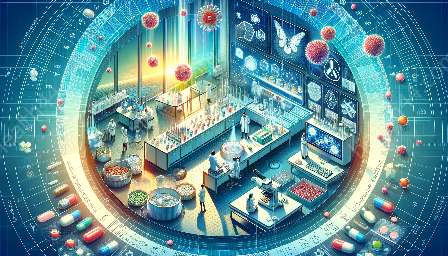Drug delivery systems play a crucial role in pharmaceutical technology and pharmacy, as they facilitate the targeted delivery of drugs to specific areas of the body, ensuring maximum therapeutic benefits and minimizing side effects. Innovations in drug delivery systems have revolutionized the way medications are administered and have opened up new possibilities for drug development.
The Importance of Drug Delivery Systems in Pharmaceutical Technology
Pharmaceutical technology encompasses the design, development, and manufacturing of drugs and drug delivery systems. Advanced drug delivery systems have significantly contributed to the field by improving the efficacy, safety, and convenience of drug administration.
Enhanced Efficacy: With the ability to target specific cells or tissues, drug delivery systems enhance the efficacy of medications by delivering them directly to the site of action. This targeted approach ensures that the drug concentration at the target site is optimized, leading to improved therapeutic outcomes.
Reduced Side Effects: By minimizing exposure of healthy tissues to drugs, targeted drug delivery systems help reduce the occurrence and severity of adverse effects. This is particularly beneficial for potent medications or those with narrow therapeutic indices.
Controlled Release: Many advanced drug delivery systems are designed to provide sustained or controlled release of medications, leading to prolonged drug action and improved patient compliance. This is especially important for drugs that require frequent dosing.
Types of Drug Delivery Systems
There are various types of drug delivery systems that have been developed to address specific therapeutic needs and challenges. Some of the most prominent types include:
- Nanoparticulate Drug Delivery Systems: These systems utilize nanoparticles to encapsulate and deliver drugs. They offer advantages such as increased drug solubility, prolonged circulation time, and targeted delivery to specific tissues.
- Implantable Drug Delivery Systems: These devices are implanted within the body to provide sustained release of drugs over an extended period. They are commonly used for hormonal therapies, pain management, and other chronic conditions.
- Transdermal Drug Delivery Systems: These systems deliver drugs through the skin and are often used for pain management, hormone replacement therapy, and nicotine replacement therapy.
- Inhalation Drug Delivery Systems: These systems deliver medications directly to the lungs and are widely used for respiratory conditions such as asthma and chronic obstructive pulmonary disease.
- Patient Education: Pharmacists are responsible for educating patients about the proper use of various drug delivery systems, including inhalers, transdermal patches, and injectable devices. This includes providing instructions on administration techniques, precautions, and potential side effects.
- Medication Management: Advanced drug delivery systems often require specialized handling and storage procedures. Pharmacists are trained to manage and dispense these medications according to strict guidelines to ensure their stability and effectiveness.
- Adherence Support: Drug delivery systems that offer improved convenience or reduced dosing frequency can enhance patient adherence to medication regimens. Pharmacists can counsel patients on the importance of adherence and provide strategies to support compliance.
- Targeted Drug Carriers: Researchers are exploring new materials and technologies to develop more precise and effective drug carriers capable of targeting specific cells or tissues with high precision.
- Personalized Drug Delivery: The concept of personalized medicine has extended to drug delivery, with the development of systems tailored to individual patient characteristics and disease profiles.
- Smart Drug Delivery Systems: These systems incorporate sensors, actuators, or responsive materials to enable on-demand drug release or tailored dosing in response to physiological signals.
- Biocompatible and Biodegradable Carriers: The quest for safer and more environmentally friendly drug delivery systems has led to the development of biocompatible and biodegradable carriers that minimize the risk of adverse reactions and reduce environmental impact.
The Impact of Drug Delivery Systems on Pharmacy
Drug delivery systems have not only transformed pharmaceutical technology but also significantly impacted the practice of pharmacy. Pharmacists play a critical role in ensuring the safe and effective use of drug delivery systems, as well as educating patients about their benefits and proper administration.
Some of the key ways in which drug delivery systems have influenced pharmacy practice include:
Advancements in Drug Delivery Technology
The field of drug delivery systems continues to witness rapid advancements, driven by ongoing research and innovation. Some of the latest developments in drug delivery technology include:
Conclusion
Advanced drug delivery systems have brought about remarkable advancements in pharmaceutical technology and pharmacy, offering tailored solutions for effective and safe drug administration. The continuous evolution of drug delivery technology holds promise for addressing unmet medical needs, improving patient outcomes, and enhancing the practice of pharmacy.


